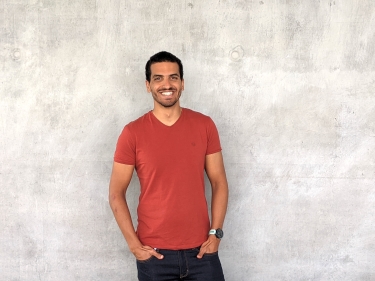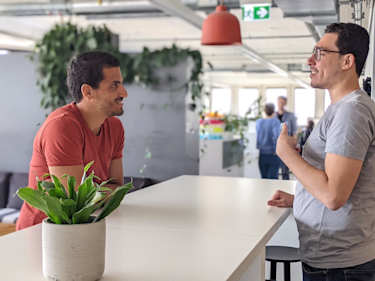People @ Billie: Meet Ahmed Gaber, our VP Engineering
Take a look “behind the curtain” and learn more about the people who shape Billie. In People @ Billie we introduce our diverse team of bright talents and learn about their respective expertise and field. One of these great talents is our VP of Engineering, Ahmed Gaber. Read about an unexpected shift in his career and how he went from managing a team of 15 to a team of 60 people.

Ahmed, how did your tech story begin?
“I am originally from Cairo, Egypt. I have been programming since I was eleven years old. It is almost as if I was always interested in technology as far as I can remember. Back in Egypt I started as a Software Engineer, and I had been working in tech for five years before coming to Germany. A highlight of my time in Cairo was my last role in an e-commerce company. We were a small team of five engineers and yet we managed to become the second biggest competitor to Amazon in Egypt.”
At what point, did Fintech and Germany become an option for you?
“To be honest, neither going into Fintech nor moving to Germany was ever part of the plan. However, when I saw the job advertisement at Zencap, a lending company for small businesses, it seemed to match my skill set and I ended up joining them in 2014 as a Software Engineer. Zencap, Funding Circle as of 2015, was the first venture of the Billie founders Matthias and Christian, and we learned a lot of lessons there that stood out to us later on.
While previously I did not know much about Fintech before moving to Berlin, I started to really enjoy it. I found the engineering work highly stimulating and very different to my previous experience in e-commerce. In e-commerce, you rarely have the opportunity to innovate and solve new problems. However, in Fintech, we were doing that every day as we had to deal with the complexity and ever-changing landscape of the European financial regulatory system.”
You have been with Billie for several years now, most recently as Director of Engineering. But in May 2021, you experienced a big shift in your career: You became interim CTO. Tell me more about this.
“Our former CTO, Artem Demchenkov, started his own business and decided to focus on this new opportunity full time. But I didn't just take on all of his responsibilities at once. It was a continuous transition. Before he left, I was already taking on more responsibilities. Initially, I was managing one of our Product Teams, but then I got promoted to Director of Engineering, which meant managing both Product teams. Quite shortly after that, I started to introduce initiatives around our Engineering Levels: I introduced the Engineering Management and the Tech Lead Position, I started the Individual Contributor material and developed career paths. During this time, there was more space for me to try new things, and to shine and grow.
At that time, we had two first-time managers and one manager who just joined. Naturally, I knew more about the domain, the company, and had more experience than others. So I saw the opportunity to just take the lead and manage this team. And because I have been with Billie for quite some time, I had enough credibility with the founders, which meant that they included me in a lot of strategic discussions early on. This way, I gained more insights and saw the bigger picture so people would come to me and ask ‘so what should we do next?’”
And then you slowly transitioned to the new role?
"Yes, the transition came quite naturally to all of us because of the responsibilities I already had assumed. Due to the official announcement as interim CTO I was able to ask for more support in the form of an external coach, who became my mentor and helped me develop the right skills to support my team. He was PayPal’s first CPO and I learned a lot from his own experience. For example, I sometimes needed to take a step back and focus more on individuals. And I believe that we, as a team, got much better thanks to his input. I was also lucky that we had good people working well together. Everything was progressing well."
So, would you say there was also a little bit of luck involved?
"Absolutely, I mean, I personally believe that there’s always luck involved. We were lucky to have natural leaders on board who, despite their little experience in people management, excelled at managing their teams. We were lucky to have people who stepped up and took on the teams that had no manager at this point. It meant that I didn’t have to worry about these teams because they were in good hands. I was also lucky with the support I got from Aiga and Matthias - either passively or actively - by allowing me to have more time to learn and try things and have enough autonomy in this area."
How did your working life change? What were specific tasks that you had to do that you never really did before?
"I knew that I was leaving my comfort zone. For example, when I worked on the new policies, I had to figure it out by myself and I realized that I cannot ask someone else. I just had to trust myself. So if the question was ‘What is the engineering strategy?’ I had to check if the product strategy was clear, then formulate the strategy, and understand people's pain points — Where are we today and where do we want to be? That was new to me and I learned to have a strategy in situations of uncertainty. There's always a strategy. And you need to be owning this, you need to decide what’s best in that situation with the resources you have. So that's something I learned.
I also had to think more about the ‘people side’. Because I had the largest team, most of the ‘people topics’ would start on my side like remote work policies or hardware policies, for example. One of the first things I focused on was retention. I reviewed all the salaries and worked on a career progression framework, because it's all about retention and attracting talented people. I really saw what impact I could have on the company, because I managed the biggest department.
And second, Engineering is the most demanding department. Good engineers are in high demand on the market, so if you want to hire top talent, you need to offer something to get them excited. So we had to raise the bar for technical hiring. We want to hire engineers, not people that just know how to write code. Engineers are able to solve problems and so we reworked all our hiring pipelines. Throughout this process, you ask yourself the question: As a Fintech, how do we ensure we are a tech-driven company, with the best talent? There are many questions around identity and cultural beliefs that are tied to this."
You said you had to come out of your comfort zone. What was the most challenging thing about being interim CTO?
"I will say it in a simple term: acquiring enough knowledge to make the right decision in a very short time. I know that my mistakes are expensive. And sometimes I was stuck between an idea, and actually making a decision. And sometimes having to accept that there might not be a perfect decision."
What did you enjoy the most about this experience?
"I would say two things: One is working together with Billie’s founders on the general company strategy, and working together with the engineering leadership team so we really became a team of managers who all work together on achieving the same goals. I really enjoyed that. The second thing I enjoyed was the work on the people management side. I enjoyed the variety of tasks. One day, it can be very technical and the next day it’s very conceptual. It can be exhausting, but it’s enjoyable."

Now that you got a glimpse of what it's like to manage the whole Engineering team, do you think this is something you would like to do again in the future?
"You're really hitting the spot with this one! I would say yes. It might have been a bit too fast and too big at the same time, because I went from managing a team of 10 to 15 people, to managing a team of 60. So if I do it again, I will try to find the right sets. Because at the end of the day, being CTO for a company of 60 people is not the same as being CTO for a company of 200, 2,000 or even 10,000 people. So I think my job today, and my new role, is not fundamentally different if we keep growing."
What’s your biggest take-away for the future?
"I really realized how important the organizational level on the tech side is, and that we need strong platform engineering. As of today, we'll call it the infrastructure team. The infrastructure team is responsible for the developer experience: security, internal tools, the reliability of our platform. So they are the ones to make sure the system doesn’t go down, or if it does, they’re the ones to fix it. This became one of my favorite topics and it’s something that’s close to my heart. I was technically building it and I am still managing it. If you’re not a tech person, it can be easily overshadowed by other topics that are important for a company. However, if this team is doing a good job, your whole engineering department will be more effective, and the engineers will be more productive and happier. So investing in this team is something that is not usually obvious. But I saw first-hand how important it is for the well-being of the company."
If you had one piece of advice for people who want to join Billie or for people who just started at Billie, what would that be?
"So, let’s focus on the tech side. For new joiners in Tech, I would say: Join Billie to learn and challenge the status quo. Billie is still growing, we are striving to automate things wherever we can and become an even more tech-driven, innovative company. And this will only be possible if every one of us does that. So join, innovate and learn."
Thank you so much, Ahmed, for your insights and for all the hard work you have done while leading Billie’s Engineering team. We are looking forward to seeing what’s next for you here at Billie.
Do you feel Billie is the right working and growth environment for you, too? Check out our current job openings on our career page. We are looking forward to hearing from you.